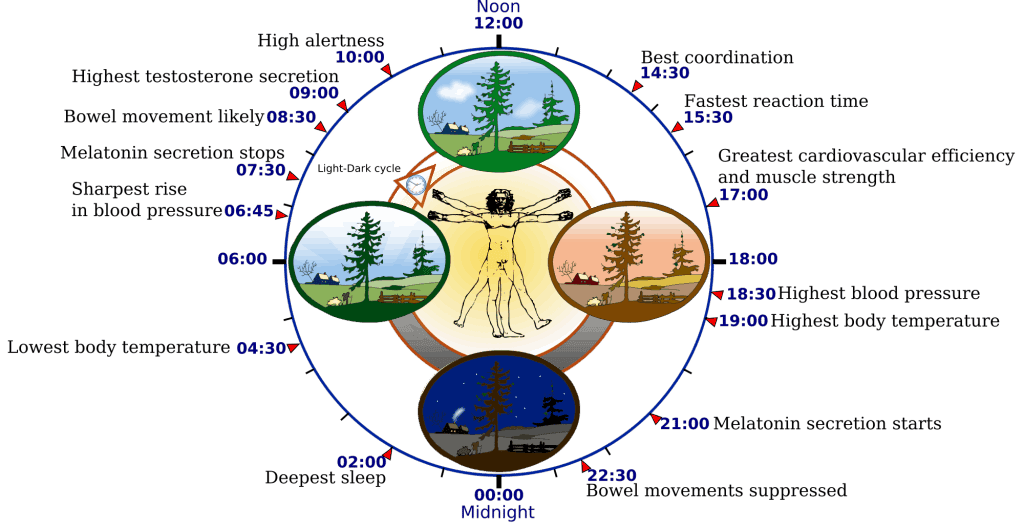A circadian rhythm is a person’s internal body clock that regulates the 24-hour cycle of biological processes. The normal circadian clock is set by the light-dark cycle over a 24-hour period and it’s important in determine the sleeping and feeding patterns in humans. Most living things, including animals, plants and even microbes, have circadian rhythms. These rhythms are produced by natural factors within the body, but they are also affected by signals from the environment. Light is the main cue that influences circadian rhythms; although humans were once thought to be insensitive to the effects of light, it is now recognized as the principal circadian synchronizer.

Each of us has an internal circadian biological clock that regulates the timing of periods of sleepiness and wakefulness throughout the day. The circadian rhythm will dip and rise at different times of the day; for instance, adults typically experience their strongest sleep drive in middle of the night, between 2:00 and 4:00 am, and in the afternoon, between 1:00 and 3:00 pm. When the circadian rhythm rises, we feel more alert, even if we have been awake for hours. These dips and rises will change depending on whether or not we had sufficient sleep the night before. People who are sleep deprived will experience more intense dips, or periods of sleepiness.
But circadian rhythms affect more than just our sleep – they can also influence hormone release, body temperature and other important bodily functions. Abnormal circadian rhythms have been associated with sleeping disorders, like insomnia, depression, seasonal affective disorder, excessive sleepiness, cardiovascular issues, obesity, diabetes and even neurological problems like depression and bipolar disorder.
Circadian Rhythm Disorders
Circadian rhythm disorders are disruptions in a person’s circadian rhythm; they can be caused by many factors, including time zone changes, medications, pregnancy, mental health problems, a vitamin or mineral deficiency, changes in sleeping routine and time zone changes. A circadian rhythm sleep disorder involves one of the following problems:
Trouble initiating sleep
Trouble maintaining sleep – waking up frequently during the night
Waking up too early and being unable to go back to sleep
Poor quality or non-restorative sleep
Jet lag, for example, is when travelers suffer from disrupted circadian rhythms. When a person travels to another time zone, her body’s clock doesn’t match her wristwatch, making the person feel groggy and disoriented until the body’s clock resets to the new time zone.
Treatments For Circadian Rhythm Disorders
Adjusting your exposure to daylight, making changes to your daily routine, and scheduling naps during the day are lifestyle changes that may help you to cope with certain circadian rhythm sleep disorders.
The body’s naturally produced melatonin also helps to regulate sleep. Not only does it control your circadian rhythms, but it is also responsible for regulating other hormones that may alter your sleeping patterns. Melatonin production actually decreases as we age, which may explain why some older adults struggle more with sleeping through the night. Luckily, several foods can naturally increase melatonin production, eliminating the need for supplementation, which don’t always offer long-lasting or significant results. Researchers have found that pineapples, bananas and oranges were able to increase melatonin presence significantly.
Pairing small portions of these fruits with a source of protein, like almond butter, can help you to regulate your circadian rhythm. It will also help to avoid eating sugary treats or simple carbs that can spike your blood sugar levels before sleep. These foods will boost your energy levels and can even cause you to wake up in middle of the night feeling hungry.
Another easy way to regulate your circadian rhythm is to set the right temperature in your bedroom. A cooler temperature, between 60 to 73 degrees Fahrenheit, decreases the body’s internal thermometer and initiates comfort and sleepiness.
Exercise is also a great way to regulate your circadian rhythms. If you find that you’re not tired when it should be time to sleep, adding in some movement in the evening can help you to initiate a dip in your circadian cycle. On the other hand, if you typically feel groggy during the day, a morning workout can help you to regulate your hormone levels, especially serotonin, which will make you feel energized.
Lastly, try to maintain a regular sleep schedule in order to regulate your circadian rhythm. Your body will become used to falling asleep and waking up at certain hours. Aim to get at least seven hours of sleep a night, which will leave you feeling well rested in the morning.